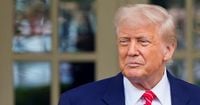In a surprising turn of events, U.S. President Donald Trump has expressed his willingness to raise taxes on the wealthiest Americans, signaling a potential shift in the Republican Party's long-standing aversion to tax increases. On May 9, 2025, Trump stated he was "OK" with the idea of increasing taxes for individuals earning $2.5 million or more and joint filers making at least $5 million. This announcement comes as House Speaker Mike Johnson considers scaling back a proposed tax cut package, which was initially set at $4.5 trillion but is now under review for a potential reduction to $4 trillion.
During a press briefing, Trump emphasized the importance of redistributing wealth to benefit middle and lower-income Americans. "What you're doing is you're giving up something up top in order to make people in the middle income and the lower income brackets save more. So it's really a redistribution, and I'm willing to do it if they want," he explained in the Oval Office. This statement marks a significant departure from the traditional Republican stance against raising taxes, particularly in light of Trump's own wealth.
Trump's proposal includes raising the top tax rate from 37% to 39.6% for high earners, a move he believes would help finance substantial tax cuts for the middle class and protect programs like Medicaid. He has suggested closing the carried-interest loophole that benefits Wall Street investors, which has drawn mixed reactions from his party. While some Republicans, like Representative Andy Harris of the House Freedom Caucus, support the idea, others, including Senate Republican leader John Thune, have expressed their reluctance. Thune stated, "We don't want to raise taxes on anybody. I mean, we're about lowering taxes on Americans."
As the debate unfolds, the Republican Party is grappling with internal divisions over spending cuts necessary to fund Trump's ambitious tax plan. The proposed tax cuts aim to make permanent the expiring provisions of the 2017 Tax Cuts and Jobs Act, which Trump has touted as a means to stimulate the economy. However, achieving the desired spending cuts to Medicaid and other programs may fall short of the $2 trillion target set over a decade.
Trump's remarks come amid concerns that any tax increase, even a small one, could be politically damaging. He cited the experience of former President George H.W. Bush, who lost his re-election bid in 1992 after breaking a promise not to raise taxes. "Democrats would seize on 'even a 'TINY' tax increase for the 'RICH','" Trump warned, highlighting the potential political ramifications of his proposal.
In a separate but equally significant development, Trump has taken decisive action against the Consumer Product Safety Commission (CPSC) by moving to fire its three Democratic commissioners. This decision, made late on May 8, 2025, is seen as a test of presidential authority over independent agencies. The CPSC is responsible for regulating the safety of consumer products, from strollers to bicycles, and has faced scrutiny from companies it oversees.
White House press secretary Karoline Leavitt defended Trump's actions, stating, "He has the right to fire people within the executive branch. It's a pretty simple answer." The Democratic commissioners, Mary Boyle and Richard L. Trumka Jr., confirmed they received emails notifying them of their firings, while Alex Hoehn-Saric, the former CPSC chairman, was informed that Trump sought to remove him as well.
The firings have raised concerns among lawmakers, with four U.S. senators—Amy Klobuchar, Maria Cantwell, Edward J. Markey, and Richard Blumenthal—writing to Trump to urge him to reverse his decision, calling it an "illegal order." The CPSC's role is crucial in ensuring consumer safety, and its recent actions have included proposing safety standards for lithium-ion batteries used in electric bicycles and scooters, which have been linked to multiple fatalities and injuries.
Trumka, one of the ousted commissioners, has vowed to challenge his firing in court, arguing that it undermines the independence of federal agencies. He stated, "The President would like to end this nation’s long history of independent agencies, so he’s chosen to ignore the law and pretend independence doesn’t exist. I’ll see him in court." Boyle has also indicated her intention to continue serving on the commission, despite the president's actions.
As these developments unfold, the Republican Party faces a pivotal moment in determining its fiscal policies and the implications of Trump's leadership. The juxtaposition of Trump's willingness to consider higher taxes on the wealthy alongside his aggressive moves to reshape independent agencies illustrates the complexities of governance in a deeply polarized political landscape.
In the coming weeks, the outcome of these discussions will be closely monitored, as they could have far-reaching implications for both the Republican Party and the American public. Will Trump’s willingness to raise taxes on the rich resonate with voters, or will it alienate the base? And how will the fallout from the CPSC firings impact the administration’s relationship with Congress and regulatory agencies? Only time will tell.




